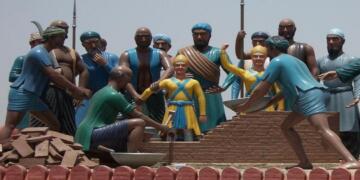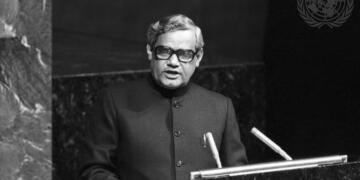After the debacle on 4th June 2024, only some expected the Bharatiya Janata Party (BJP) to win the assembly election in a state like Haryana. But it did and did it on the same strategy it adopted during the Lok Sabha elections.
The party pulled all other communities except Jats towards it and cruised through in Haryana despite Congress registering an 11 percent increase in its vote share.
It repeated the script in Jharkhand. In public rallies, television debates, and interviews, its leaders were constantly attacking Jharkhand Mukti Morcha (JMM) while the incumbent left no stone unturned to paint it as anti-tribals and anti-Muslim.
BJP’s counter against it was the galvanisation of non-tribal and non-Muslim voters. Theoretically, this would grant it to two-thirds of voters in the state. While the party did not need to toil hard for General Category and Scheduled Castes, its Other Backward Classes push got a setback due to one PhD student named Jairam Mahato.
Mahato belongs to the Kurmi-Mahato community – which comprises approximately 15 percent of the population and is traditionally considered a vote-bank of the BJP-led National Democratic Alliance.
Jairam Mahato gained significant attention when he led a movement against the inclusion of Bhojpuri, Angika, and Maghi languages in district-level competitive exams in Jharkhand.
He argued that the speakers of these languages form a small portion of the population, and their inclusion in such exams was unnecessary. Mahato also voiced concerns that this policy could marginalise tribal candidates, as they do not typically speak these languages.
The issue quickly became intertwined with the ongoing Jharkhandi-versus-outsider debate, which has persisted since the state’s formation in 2000. Varying estimates suggest that outsiders like Biharis, Bengalis, and UPites comprise 32-35 percent of the state population. They are believed to have come here for a job but settled after buying land.
For Mahato, the criteria to differentiate whether one is an outsider or Jharkhandi is a 1932 land survey conducted by the British government. Many in Jharkhand believe that only individuals settled in the state before 1932 should be considered true Jharkhandis.
The year 1932 marks the British colonial-era land survey, which locals view as a pivotal moment that led to ecological degradation and the displacement of indigenous communities.
Previously, the Soren government agreed to Jairam Mahato’s demand and passed a bill to establish a recruitment policy based on the 1932 land records and domicile criteria. However, the Jharkhand High Court ruled the bill unconstitutional, striking down the policy.
Riding on sentiments, Mahato established the Jharkhandi Bhasha Khatian Sangharsh Samiti (JBKSS). Though the language demands were addressed, Mahato expanded the scope of his organization and became more involved with the local community.
In June 2023, JBKSS transitioned into a political entity. The group began conducting door-to-door surveys to better understand the challenges faced by the common Jharkhandi citizen and broadened its focus to include a range of social and economic issues.
Alongside the Khatiyan debate, Mahato has consistently criticised the state’s industrial policies. He highlights how Jharkhand generates electricity that powers homes in Bangladesh, while local residents endure only limited power supply, averaging just five to six hours a day.
Additionally, he has raised concerns about industrial pollution, particularly its link to rising infertility rates among women due to unchecked mining practices.
Mahato’s growing political influence has led to massive rallies, sometimes attracting crowds of thousands or even lakhs. Encouraged by it, he decided to contest the Lok Sabha elections. However, since his party was not recognised, candidates including Mahato contested as independents.
Mahato and his allies Devendra Nath Mahto and Sanjay Kumar Mehta were especially notable positives from election results as they finished third in Giridih, Ranchi, and Hazaribagh respectively. In all these seats, they ultimately became roadblocks for the JMM and its ally Congress.
Considering that Mahato criticised JMM in a hushed tone before elections but worsened its prospects in elections meant that his loyalty was not clear to most.
Simultaneously, Mahato emerged as a bigger threat to the BJP and its coalition partner All Jharkhand Students Union Party (AJSUP). Before Jairam’s rise, AJSUP was considered the number one choice for Mahato voters, but Jairam complicated the situation.
Moreover, AJSUP’s chief Sudesh Mahato’s worsening image as a leader who is not in touch with ground reality also became a problem. Sudesh is considered by many to be someone who gets active only around the time of election. It is pertinent to note that, in his younger days Sudesh was more firebrand than Jairam is right now.
Jairam started to take up this space and his party is now called Jharkhand Loktantrik Krantikari Morcha (JLKM).
He did not stop and continued releasing videos and giving fierce speeches against the established order. At many places, he went and confronted government officers or senior managers of private corporations in the state. The videos gather millions of views inside the state itself – thanks to WhatsApp groups which are deployed to amplify them.
One downside of it is that radicalisation against people considered as outsiders is gaining momentum. People who moved to Jharkhand in the exercise of their constitutional rights are now being portrayed as villains by their own neighbours who have a superiority complex due to being Jharkhandi under Mahato’s definition.
Recently a video went viral (outside Jharkhand) in which a child not even aged 10 was telling others to go away as he thought Jairam would not approve of them. In his own Dumri assembly constituency of Giridih Lok Sabha, people mainly from Kurmi Mahato invoke Khatiyan even in simple municipality issues like the placement of dustbins outside the house.
Inderjit, a 28-year-old youth said that a local cycle store had to shut his shop due to being harassed by his supporters. The complaints keep increasing day-by-day and Jairam knows it but is not ready to buckle down under moral pressure.
When asked about it at a conference, he blamed decades of corporates’ exploitation for his anger and millions of people listening to him.
Invoking the past to create fear in the present is something his former friends also do not like. Tirth Nath Akash, one of his close associates during the movement and Lok Sabha elections said that Jairam lies a lot and often invokes violent past to gain sentimental points.
Tirth Nath Akash is contesting as an independent from the Bermo assembly constituency and says that Jairam has lost his way. According to him, the movement was only for language and preferring locals in government jobs but Mahato turned it into Khatiyan and later scheduled tribe reservation issue for his Mahato community issue.
Sanjay Mehta, another senior leader in the movement also echoed similar sentiments about Jairam. Both leaders felt that they were deliberately not given proper space in Jairam’s party since he wanted everything for himself. Insult is the common reason why most leaders who were in the faction left the party.
But Jairam – also called Tiger – for his fearless attitude is not willing to buzz. His outfit has fielded 71 candidates and each of them has toed the party line till now. Fielding 71 candidates is extraordinary but Jairam is probably taking inspiration from his Lok Sabha spectacle.
However, the fact of the matter is that during Lok Sabha, youth was behind him for the promises of a job and a better life. But now, the ST status for Mahatos is also an issue for Jairam and everyone is not fully comfortable with it, especially the youth and tribals.
That is the reason his electoral semblance is limited to 32-35 seats only due to Kurmbis being in significant numbers to either decide the election or emerge as kingmaker.
Also Read: Jharkhand Assembly Elections: Exit Poll of Poll Numbers predicts evenly poised results
Axis My India exit poll put JLKM’s vote share at eight percent and seat share between one and four. These numbers could be crucial in case both factions led by BJP and JMM do not get the desired seat share. However, both JMM and BJP dismiss it.
Whatever the result, Mahato will watch it on his new iPhone bought from funding.






























